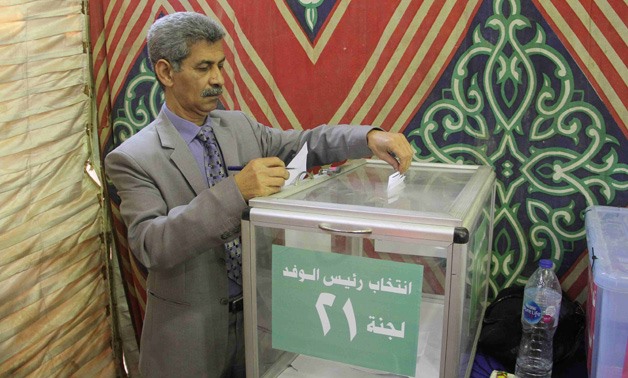
Wafd Party chairmanship race kicks off on Friday, March 30, 2018 - by Ashraf Fawzy
CAIRO – 30 March 2018: The Wafd Party chairmanship election kicks off on Friday. The candidates include Wafd Party Secretary-General Bahaaeddin Abu Shoka; Hossam Al-Kholi, deputy chairman of the party; Yasser Hassan, head of the party’s media committee; and Alaa Shawally, grandson of Saad Zaghloul, the late founder of the party.
.JPG) Wafd members gathering for voting in the party's chairmanship elections- by Ashraf Fawzy
Wafd members gathering for voting in the party's chairmanship elections- by Ashraf Fawzy
The party’s general assembly opened its doors for 4,450 Wafd members who have the right to vote in the election, which started on Friday at 9 a.m. and is scheduled to end by 5 p.m.
The current Wafd leader, El-Sayyid el-Badawi, has held this position since 2010, serving two four-year terms. According to Wafd’s new regulations, he cannot run for this position for a third time.
Wafd members are also voting on Badawi’s suggestions to change 15 articles of the party’s regulations.
.JPG) Wafd members vote for the party’s new regulations – by Ahmed Fawzy
Wafd members vote for the party’s new regulations – by Ahmed Fawzy
A number of Wafd Party members of Parliament announced their support for Al-Kholi, including Soliman Wahdan, Mohamed Fouad, Talaat el-Swedi and Ahmed el Segini, in addition to some members of the party’s supreme commission, including Hany Sary el-Din, Sherif Hamouda, Main Rady and Yasser Quora.
Sources previously told Egypt Today that Wafd Party Secretary-General Bahaaeddin Abu Shoka met with a number of party officials on March 13, including Amr Moussa, "Honorary President" of the party for life; Mahmoud Abaza, former chairman of the party; and Mounir Fakhry Abdel Nour, former minister of industry, trade, and investment.
According to sources, Moussa, Abaza and Abdel Nour have agreed to support Abu Shoka for the chairmanship of the party.
 Wafd Party chairmanship elections on Friday 30 March 2018 - by Ashraf Fawzy
Wafd rejects Badawi’s candidacy for Egypt’s 2018 presidential race
Wafd Party chairmanship elections on Friday 30 March 2018 - by Ashraf Fawzy
Wafd rejects Badawi’s candidacy for Egypt’s 2018 presidential race
Days before the National Elections Authority (NEA) closed the door for any potential presidential candidate to submit their requests, President Abdel Fatah al-Sisi was the only potential candidate who submitted his request to conduct a medical examination and work on gathering the needed candidacy papers.
Then, the 68-year-old candidate Badawi submitted a request to the Ministry of Health and paid the medical examination fees in order to provide his candidacy papers to the NEA, according to Emad Kazem, head of the Specialized Medical Boards.
However, the party’s supreme committee then rejected the nomination of Badawi according to a public vote of the committee’s members following a meeting at the party’s headquarters in Dokki.
Ahmed el-Segeny, member of the party’s executive bureau, said after the meeting that the party is satisfied with President Sisi’s performance during his first term in office and that they were willing to back him for second term instead of pushing another candidate.
 Wafd Party Chairperson Sayyid El-Badawi with the party members in a meeting held over his nomination for presidency on Saturday, 27 January 2018- Egypt Today/Amr Moustafa
Wafd Party Chairperson Sayyid El-Badawi with the party members in a meeting held over his nomination for presidency on Saturday, 27 January 2018- Egypt Today/Amr Moustafa
 Members of Wafd party raising signs support Sisi for a second term amid a state of division within it over Badawi's nomination for 2018 presidential election- Egypt Today/ Amr Moustafa
Wafd Party’s long history
Members of Wafd party raising signs support Sisi for a second term amid a state of division within it over Badawi's nomination for 2018 presidential election- Egypt Today/ Amr Moustafa
Wafd Party’s long history
Wafd is believed to be Egypt’s oldest national liberal party and it has always played a significant role in the Egyptian political scene. It is sometimes called the “New Wafd Party” because it is the extension of the original one that was dismantled after the 1952 Revolution. The New Wafd Party was established in 1978.
Wafd’s history dates back to the beginning of party life under the monarchy, making it the oldest among existing Egyptian political parties.
Saad Zaghloul, an Egyptian revolutionary and statesman, transformed the popular delegation to the post-World War I Paris Peace Conference into a political party carrying the name Wafd (Delegation). Shortly thereafter, King Fuad I declared Egypt a constitutional monarchy and issued a new constitution that paved the way for forming Egypt’s first elected parliament after British recognition of the country’s independence. The Wafd Party won the majority of seats in Egypt’s first parliament in 1924, and Zaghloul became Egypt’s first prime minister under the new constitution.
After the 1952 Revolution, Wafd was dissolved, along with all other political parties, until 1978, when President Anwar Sadat allowed the formation of political parties. Wafd was resurrected under the name “New Wafd Party”, now known simply as Wafd.
Additional reporting Mohamed Abdel Maguid


Comments
Leave a Comment